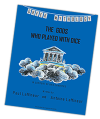One day on Mount Olympus the gods started arguing where the centre of the world could be . Every god had a precise idea of the location of the centre of the world but the problem was that each of them had a different idea. So Zeus decided to take the matter into his capable and powerful hands. He knew exactly what needed to be done to have a precise, an accurate and a non disputable location.
His method was quite original : he freed his two sacred eagles in opposite directions. When the two eagles finally met, Zeus declared the site to be the heart of the world : it was at Delphi.
No one, but no one challenged the short tempered King of the gods.
Therefore Delphi became officially the center of the world.
And what a splendid place : nestled high up of Mount Parnassus, overlooking the valley of Phocis.
Unfortunately, it was also the nest of the giant serpent Python. So Apollo, the fantastic archer, went on a hunt, in order to please his mighty father but more importantly to take his revenge against Python which had been pursuing relentlessly his then pregnant mother, as the terrible snake was following the orders of the scorned Hera.
Apollo exterminated Python at the precise location of Gaia ‘s oracle, he thus inherited its prophetic power.
From this time, Delphi will be forever linked to Apollo. Delphi will become the spiritual center of Ancient Greece. Many myths and epics originated here from the prophecies spoken here.
Kings, heroes, mere mortals would travelled from afar to beg for an answer to their questions.
Apollo also presided here over the Pythian Games that Zeus had initiated. The Pan-Hellenic Pythian Games were the precursors of the glorious Olympic Games which were presided by Zeus.
Also the practice of bestowing laurel wreath, a practice associated with the Olympic Games, began at Delphi. Winners of the Pythian Games were awarded such wreaths.
Six months before the start of the Pythian Games, nine citizens from Delphi, called Theoroi, would start traveling across the Greek cities to announce the beginning of the games and to declare the start of the Sacred Truce (Hierominia), aiming to protect the athletes and the travelers that would travel to Delphi. Any city that would be involved in robberies or armed conflicts during that period would be banned from the games, which was a terrible punishment but they would also be banned of the sanctuary of Apollo, unable to consult the Oracle, an even worse punishment.
The Delphic Oracle was an Apollonian high priestess who would be seated over the volcanic fumes at Delphi, she would inhale them and then deliver prophetic mutterings.
The high priestess was also known as the Pythia.
If Delphi was the major religious, social, and political site in the ancient world, it was also a bank or a safe for all the Hellenistic world. All the cities -states would keep their treasuries along the Sacred Way . Several of these could still be seen today.
Thousands of people, from commoners to Kings, would travel to the Sanctuary of Apollo to listen to the oracles of Pythia. After the fall of the Greek city-states to the Roman and later the rise of Christianity in the 4th century AD, Delphi remained an active sacred (now pagan) site and the Pythian Games were celebrated at least until 424 AD.
Unfortunately, after that time, it is unknown what Delphi and the sanctuary became. There is no documented information. Eventually, the Sanctuary of Apollo got buried under the mountains from too many earthquakes.
“Over the entrance to the temple at Delphi was a famous inscription: KNOW THYSELF! It reminded visitors that man must never believe himself to be more than mortal — and that no man can escape his destiny.”
Jostein Gaarder, Sophie’s World

